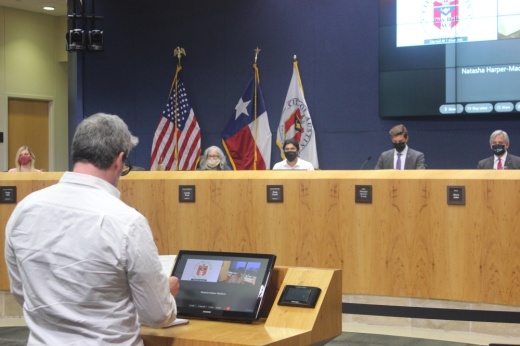During a July 22 public hearing on Austin's proposed fiscal year 2021-22 budget, the majority of residents calling into the meeting or speaking before council members at City Hall requested a reconsideration of the police department's place in the financial outline. Drafted by City Manager Spencer Cronk and first presented July 9, the preliminary $4.5 billion plan would dedicate $442.81 million to APD operations.
That figure represents a 2.44% increase over the department's fiscal year 2019-20 total, and a 42.98% jump from the $309.71 million budgeted to APD last year following some cuts and shifts, and with a portion funding dedicated to the city's "reimagining public safety" efforts. Of the money reserved for APD through last year's amended budget, the city estimates the department has spent around $305.82 million.
The proposed APD budget's return to a pre-2020 level is partially the result of the passage of House Bill 1900 this spring. That measure forces large cities that defunded their police departments last year to either revert to previous public safety funding levels or face new property tax caps and see a portion of sales tax revenue funneled to the state, among other penalties.
Some officials this summer said the 2021-22 budget was crafted with that threat in mind, while retaining a focus on the transformation of some public safety practices that began last year. Even so, HB 1900 and its fallout was referenced by many citizens July 22 who appealed for reductions to the policing budget and a further focus on ongoing reform efforts.
“I’m deeply disappointed; I know that you are struggling with what’s been happening at the Texas [Legislature] ... but I still believe that there’s a lot that the city can do to move forward with the vision for reimagining public safety," District 1 resident Andrea Black said.
During the hearing, District 4 Council Member Greg Casar said officials may be in agreement on a plan to petition the state to allow Austin's forensics lab to remain outside of APD's purview without it affecting HB 1900's financial effects. That process has not yet been voted on by council members and would require Austin to submit a waiver request for Gov. Greg Abbott's consideration.
"I think there is consensus ... to get this done," he said. "I expect that this dais will work together to do everything we can to maintain the independence of the lab to exonerate people who didn’t commit a crime and hold people accountable.”
Several speakers also commented on the status of the recommendations produced this spring by the community-led Reimagining Public Safety Task Force, many of which have yet to be fully vetted or implemented by the city.
Cronk said in his July budget presentation that the city "will not abandon" its reimagining programming this year; despite the elimination of last year's new $44.85 million Reimagining fund, his plan for the coming year would see $27.2 million dedicated to the process including less than $2 million for task force recommendations. The task force had estimated all of its proposals could cost tens of millions of dollars alongside APD cuts and reallocations.
“We spent hundreds of hours as part of the task force process," said Cate Graziani, a task force member and co-executive director of the Texas Harm Reduction Alliance. "With only $1.9 million allocated to the recommendations and a record high for the APD budget, the proposed budget really shows a complete departure from that path that we embarked upon together only 11 months ago."
Among other concerns raised at the session were the millions of dollars to be dedicated to two new APD cadet classes while the current, probationary cohort remains in training and under review, and a lack of expansion to programs for people experiencing violence.
Not all comments at the meeting were opposed to the APD financial plan, with several representatives of the Greater Austin Crime Commission speaking to the need for additional police funding in the face of rising crime in the city. Cary Roberts, the group's executive director, said more cadet class funding should be a top priority for officials this summer due to a staffing shortage at APD.
"We’ve got challenging times. Crime rates are up in categories that signal violent crime trends, response times are slower, the police department will make further staff reallocations on Aug. 1," he said. "Continuing cadet classes is the most important thing we can do now to address the alarming attrition and staffing crisis."
Council will once again hear citizen feedback on the budget framework during a hearing scheduled for July 29. The final budget adoption will then take place Aug. 11-13. More information on the process may be found on the city's budget engagement website.





